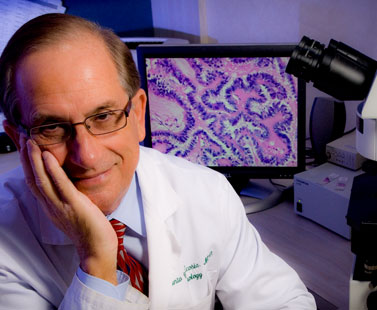USF researchers win grant to study ovarian cancer
Some 25,000 women are diagnosed each year with ovarian cancer.
Most of them don’t find out about it until it’s too late.
“Nearly 15,000 of them are dead within five years,’’ said Dr. Santo Nicosia, professor and chair of the Department of Pathology and Cell Biology.
Dr. Nicosia and Dr. Patricia Kruk, professor of pathology and cell biology, are working to change those statistics. They hope their research could help provide a reliable early test for the disease, so that more women could be diagnosed with ovarian cancer before it spreads.

Santo Nicosia, MD, and Patricia Kruk, PhD
“If the disease could be more reliably diagnosed at an earlier stage, while it’s still confined to the ovaries, then you could just remove the ovaries without complications,” said Dr. Kruk. “You could save thousands of lives.”
Dr. Nicosia and Dr. Kruk have won a prestigious Idea Development Award from the U.S. Department of Defense. These grants, used to fund innovative research, are extremely competitive, with only 8 to 10 being given out each year across the nation.
The 3-year grant, for almost $700,000, will allow Dr. Nicosia and Dr. Kruk to work on developing a test for ovarian cancer, using the protein angiostatin as a biomarker. The new grant will allow Dr. Nicosia and Dr. Kruk to expand on their preliminary data and compare angiostatin to bcl-2, the protein that Dr. Kruk has studied, as well as with other potential markers.

Dr. Kruk suspects that using a combination panel of several biomarkers holds the most promise for a more sensitive and specific test – one that won’t yield too many false positive results among healthy patients or false negative results for patients with disease.
“It’s been very difficult to find one unique biomarker for ovarian cancer that can distinguish benign tumors from early cancer,” Dr. Kruk said.
The new DOD grant will allow the researchers to screen more study participants, helping validate their work, Dr. Nicosia said. He and Dr. Kruk will collaborate with clinical and translational investigators at USF Health, H. Lee Moffitt Cancer Center & Research Institute, Fred Hutchinson Cancer Research Center in Seattle and M.D. Anderson Cancer Center in Houston to obtain urine and blood samples from healthy women, women with benign ovarian lesions, women with a family history that increases their risk of ovarian cancer, and women diagnosed with ovarian cancer.

USF is applying for a patent based on Dr. Kruk’s earlier studies of bcl-2 in hopes of using it to develop a less invasive, more reliable screening test.
— Story by Anne Delotto Baier and Lisa Greene, USF Health Communications; Photos by Eric Younghans, USF Health Communications

